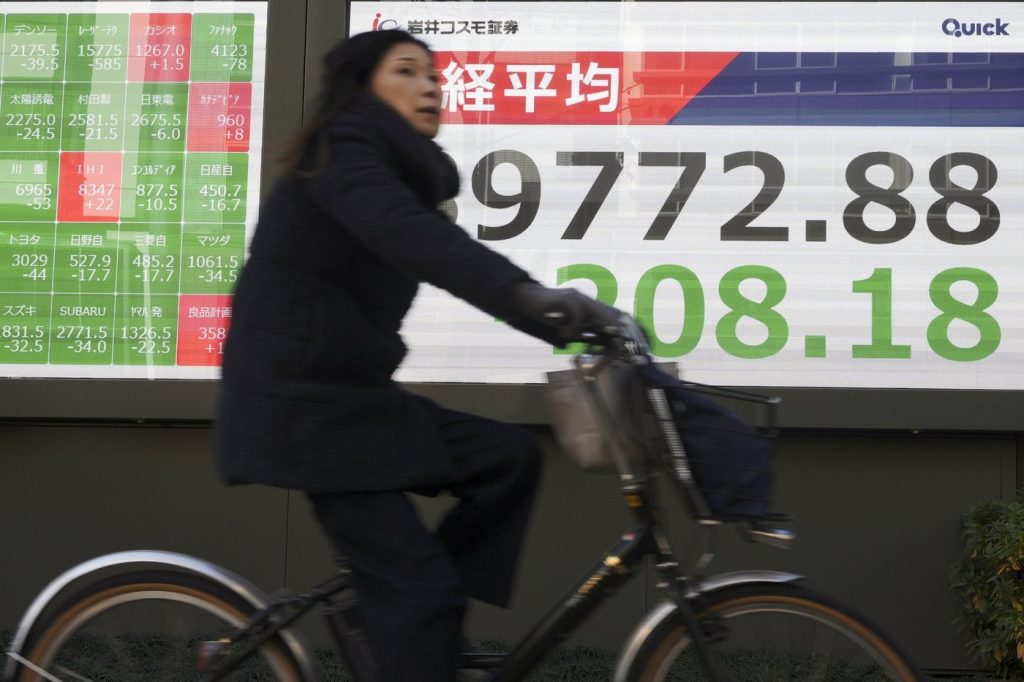BANGKOK (AP) – European shares began trading on a positive note on Friday, while Asian markets experienced a downturn following the closure of U.S. markets to commemorate a National Day of Mourning for former President Jimmy Carter.
The German stock index, DAX, remained stable at 20,316.29. Meanwhile, the French CAC 40 experienced a slight decline of 0.1%, ending the day at 7,486.82. In London, the FTSE index dipped by 0.1% to reach 8,312.55.
In the U.S., futures for the S&P 500 were down by 0.4%, with the Dow Jones Industrial Average futures also decreasing by 0.3%. Analysts noted that the general decline observed across Asian markets indicated waning confidence regarding potential further cuts in interest rates by the Federal Reserve. This sentiment followed recent data showcasing unexpected resilience in the U.S. economy.
Minutes released from a Federal Reserve meeting held on December 17-18 revealed that officials anticipated a deceleration in the pace of interest rate cuts for the year, citing persistent inflation and the looming threat of widespread tariff increases under incoming President Donald Trump as significant factors influencing their decision.
Tan Jing Yi from Mizuho Bank commented on the current market climate, suggesting that there exists a level of anxiety regarding the Fed's policy being more restrictive than what is necessary to maintain an assertive risk-taking environment. The uncertainty surrounding Trump's potential economic policies, especially in terms of tariffs against China and other nations, has left investors hesitant just days before his inauguration on January 20.
ANZ Research indicated in a report that while increased tariffs on Chinese goods are expected, the extent of tariffs on other economies in the region remains ambiguous. They also questioned whether universal tariffs could still be a possibility.
Market watchers were particularly focused on a non-farm payroll report scheduled for release from the U.S. Labor Department later that day. In Tokyo, the Nikkei 225 index sank by 1.1% to 39,190.40, while the Kospi in South Korea declined by 0.2%, resulting in a total of 2,515.78.
Chinese markets saw a continuation of losses, with the Hang Seng index in Hong Kong dropping 0.9% to 19,064.29, and the Shanghai Composite index falling by 1.3% to 3,168.52. Australia's S&P/ASX 200 index decreased by 0.4% to 8,294.10.
However, gains were noted in Bangkok, where the SET rose by 0.3%. Conversely, India's Sensex fell by 0.3%, and Taiwan's Taiex experienced a slightly higher drop of 0.3%.
In the United States, the bond market remained operational until its recommended closure at 2 p.m. Eastern Time on Thursday. Following a strong rally, yields remained fairly stable but have unsettled the stock market. The yield on the 10-year Treasury was recorded at 4.69%, slightly lower than the day's prior peak of 4.70%, which was its highest level since April. It had been below 3.65% in September.
Higher yields often pressure the stock market as borrowing costs for companies and households increase, diverting some investors to bonds instead of stocks. Yields have been rising largely due to better-than-expected economic reports from the U.S., coupled with concerns surrounding inflationary pressures that might arise from Trump's proposed tariff, tax, and policy changes.
In early dealings on Friday, U.S. benchmark crude oil saw an increase of $1.12, reaching $75.04 per barrel, while Brent crude rose by $1.14 to $78.06 per barrel. Additionally, the U.S. dollar decreased to 157.68 Japanese yen from 158.14 yen, whereas the euro saw a slight increase to $1.0303 from $1.0301.










